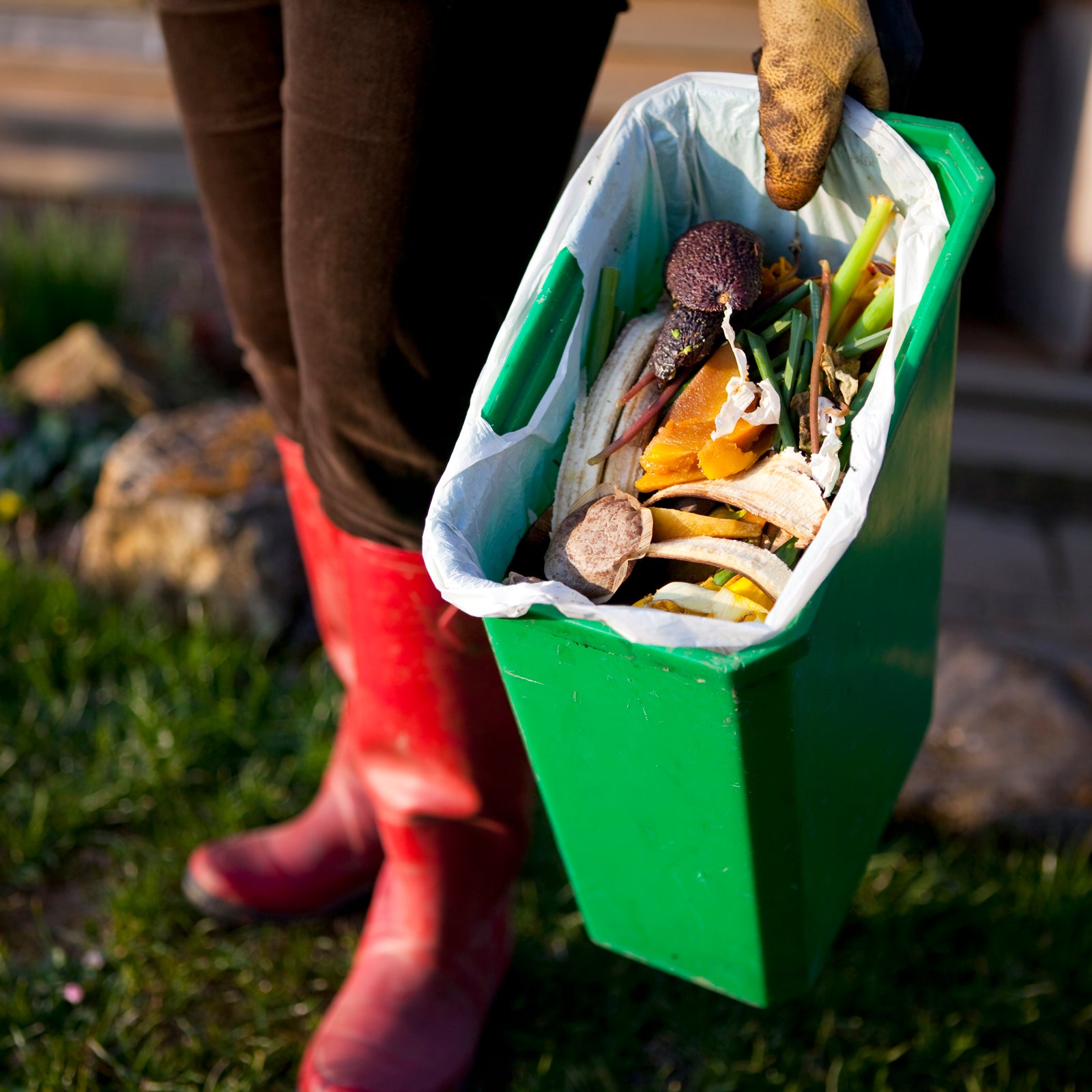I’m staring at the sad remnants of a stir-fry: three shriveled pieces of bell pepper, a spoonful of sauce, and mouthful after mouthful of dry quinoa. I sigh, dump it into a bowl, and put it in the microwave.
A week ago, I would have tossed these leftovers without a second thought. But I’m three days into a monthlong experiment to see whether I can curtail my food waste, and it’s far too early in the investigation to let these leftovers become compost. So I eat the quinoa, bite by dry bite.
Wasting food is one of America’s many climate sins. Almost a third of all calories produced in the United States ends up in the trash, according to from the U.S. Department of Agriculture. And it mostly happens at home.
According to the USDA, grocery stores waste about 10 percent of our food (with greens being the worst offenders), but we’re throwing away more than double that, 21 percent, at home. That’s because people like me make too much quinoa and not enough stir-fry and chuck the extra, or we buy a package of carrots and use just two for a recipe, letting the rest rot, says Jonathan Deutsch, a professor who works on food waste issues in the Department of Food and Hospitality Management at Drexel University.
This is a waste of energy—it takes tons of fossil fuel to grow, store, and move that food—and decomposing food creates tons (, to be exact) of greenhouse gases. A issued by the U.N.’s Food and Agriculture Organization estimates that if global food waste were its own country, it would rank just behind China and the United States in terms of total carbon dioxide emitted.
The best thing you can do to combat food waste is change your bad habits and buy less, plan meals, and eat more leftovers. Which is what I attempted, and it didn’t go all that well.
I made a meal plan the first week. I mapped out three dinners for my husband and me, hoping each meal would be enough for two nights and one might stretch for three. I surveyed what I already had: some salad greens going limp, celery and carrots, and half a package of parsnips that I’d used for a previous recipe. I figured a soup could use up the parsnips, celery, and carrots, and if I was diligent in making side salads, I could get through the lettuce, too. From there, I planned out my other meals and made a shopping list.
I shopped to my plan, made the dishes, dutifully ate my leftovers, and loaded my salads with spinach to make sure it all got consumed before it turned slimy. I fed the bad spot on my tomato to my secret food-waste weapon: my chickens. At the end of the week, the compost bin was nothing but eggshells and coffee grounds, and I was smug as hell about it.
I planned out week two the same way. First up was venison stew. Unfortunately, the recipe made enough to fill a bathtub. It lasted and lasted. While we plugged away at it, the herbs I’d purchased for fish later in the week went south. Finally, by day six, my husband mutinied. We chucked the dregs of that damn stew. I felt guilty about it, but, well, there’s only so much any one person can endure.
Week three is when the wheels started to come off. My garden burst into productivity, with the cucumber and green bean vines going bonkers. Tomatoes started rolling in. There was no need to grocery shop, and suddenly we couldn’t eat fast enough.
A booming garden takes time to pick and weed and water. Finding hours to cook or pickle what you’ve grown can be a struggle. I looked for more ways to use produce. Every client who bought eggs from our farm got a free cuke; every dinner was served with a salad. Corn and peas got washed, blanched, and thrown into freezer bags. Green beans won’t have quite the same snap, but they’re fine in soups or tossed into a stir-fry, so those were saved too. I also started freezing tomatoes. Come November, when things slow down on my farm, I’ll can them into pasta sauce. I picked herbs and hung them in my pantry to dry and whirred basil into pesto, which, by the way, freezes beautifully.
Despite all these efforts, we still ended up with okra that got too big to eat (it gets tough and doesn’t taste very good), and I forgot about beans I left in the fridge. Finding time to cook this week was so hard that I didn’t knock through everything on my list. Every morning, I’d look at two wilting bananas and say, “I’ll make banana bread later.” Every evening, I went to bed thinking, “I’ll make it tomorrow.” (I ended up giving those bananas to the chickens.)
I guess what I’m trying to say here is it takes time, effort, and creativity to really eliminate food waste, especially when your life is hectic.
I entered the fourth week ready to get back on track. And then, on Monday, a work assignment went sideways. It was a time-sensitive story that needed major updates at the last second. My intentions of tossing pasta with pesto and fresh veggies vanished. We were both so busy that we settled for Trader Joe’s frozen Indian meals that night. I should have cooked the pasta on Tuesday, but a friend asked if I wanted to go for a gravel ride after work, and I made nachos afterward. Meanwhile, my garden produce was piling up, as was my guilt. When I finally made the damn pasta on Wednesday, I cooked too many noodles. Old habits die hard.
I tried valiantly to eat those leftover noodles for lunches, topped with a fried egg and some cheese. Two days later, I threw the last handful to my chickens. And not making salads the first two nights of the week meant a bunch of my lettuce and a couple cucumbers had gone south. At the end of this failed week, three pounds of produce hit my compost pile.
I found this month to be surprisingly stressful. It felt like I was always one late work night away from wasting something. But there were upsides. Because I was planning more and shopping more thoughtfully, there were fewer nights where my husband and I looked at each other blankly at 8 p.m. and said, “Oh, I guess we need to think about dinner.” I can’t say for sure whether I saved money, since my garden was producing so much during the month. But my compost bin was definitely much lighter than usual, and that felt like a win.
Here’s what else I learned in my month of trying to go zero waste.
- Take small portions. I downgraded my portion size and told myself I could go back for more, rather than taking too much and throwing the last bites away.
- Read the serving size on the damn pasta box. Once I started doing this and not just dumping the entire box into boiling water, I stopped having totally out-of-whack pasta-to-sauce ratios.
- Salads and pickles are your best friends. Any veggies that are looking a bit soft need to be turned into a salad or sliced thinly and made into a quick pickle. I used up radishes, carrots, and beets by covering them with red wine vinegar, a pinch of sugar and salt, and a splash of water. Refrigerated, they should keep for a week, and they’re terrific tossed in salads or added to a sandwich.
- Start a stock bag in your freezer. Veggie trimmings, Parmesan rinds, and meat bones all make great stock. Freezing this stuff buys you plenty of time to collect enough for one big pot.
- You are composting, right? If your city doesn’t allow backyard composting, check your local farmer’s market—many will collect compost scraps. (Composting is the second-least effective option on the EPA’s , but it’s still better than throwing scraps in the garbage.)
- Make past-its-prime fruit into compote. If part of your peach is moldy, cut off that section and freeze the rest. When you have a bag of ugly fruit collected, put it on the stove with a bit of lemon juice, a splash of water, and a touch of sugar. Let it simmer slowly until it forms a thick fruit compote. It’s the best ice cream topping ever.
- Getting a few backyard hens is really the easiest way to feel like your unwanted food gets put to good use—if you have the time and space to do so.
- Finally, use to give away your extras. Local food banks don’t have the time or energy to deal with a bag of unwanted carrots, but your neighbor might. And, no, it’s not weird to post the produce you can’t eat on Facebook to see if anyone nearby wants it.


